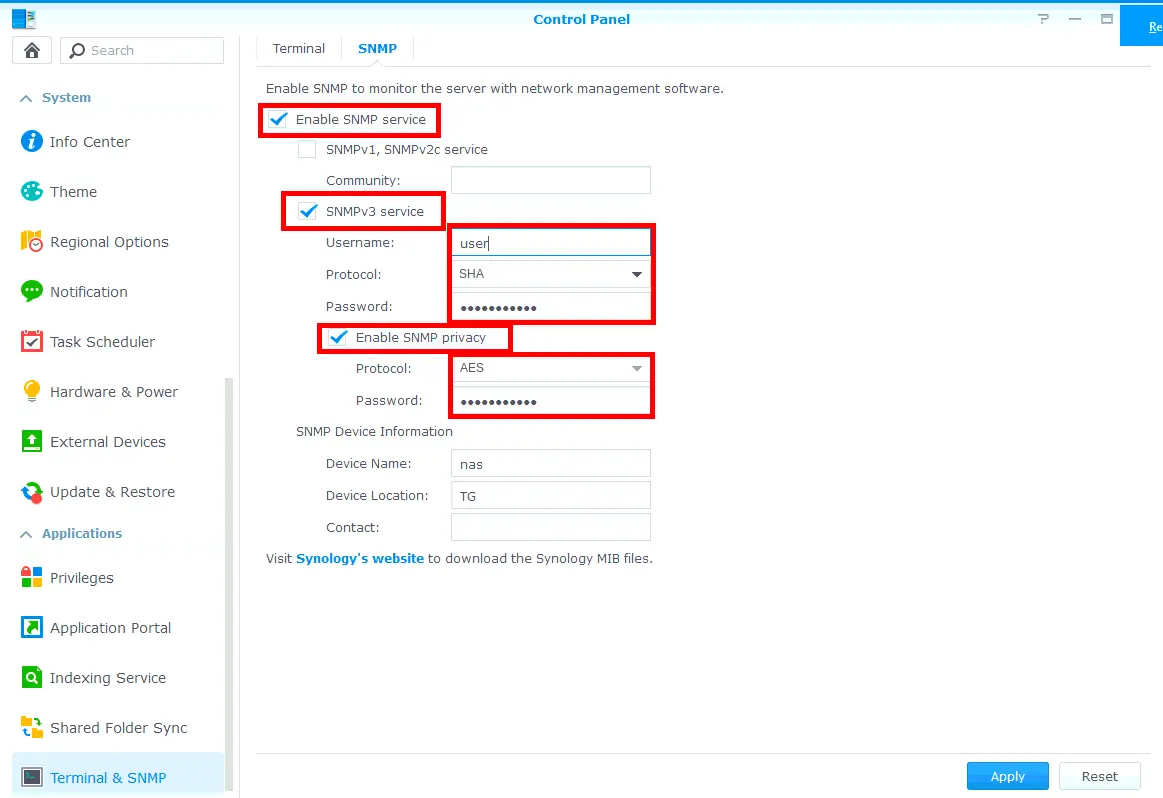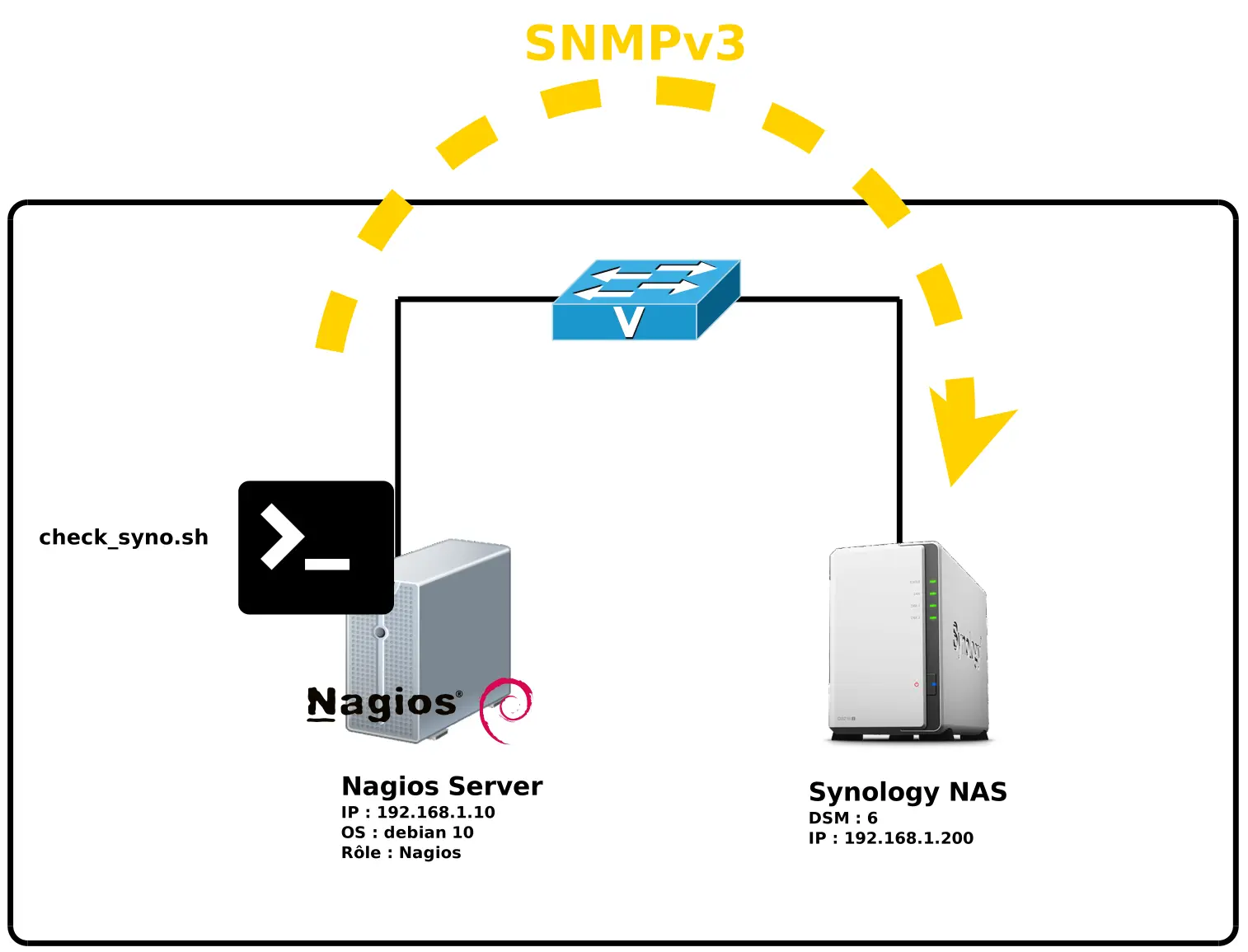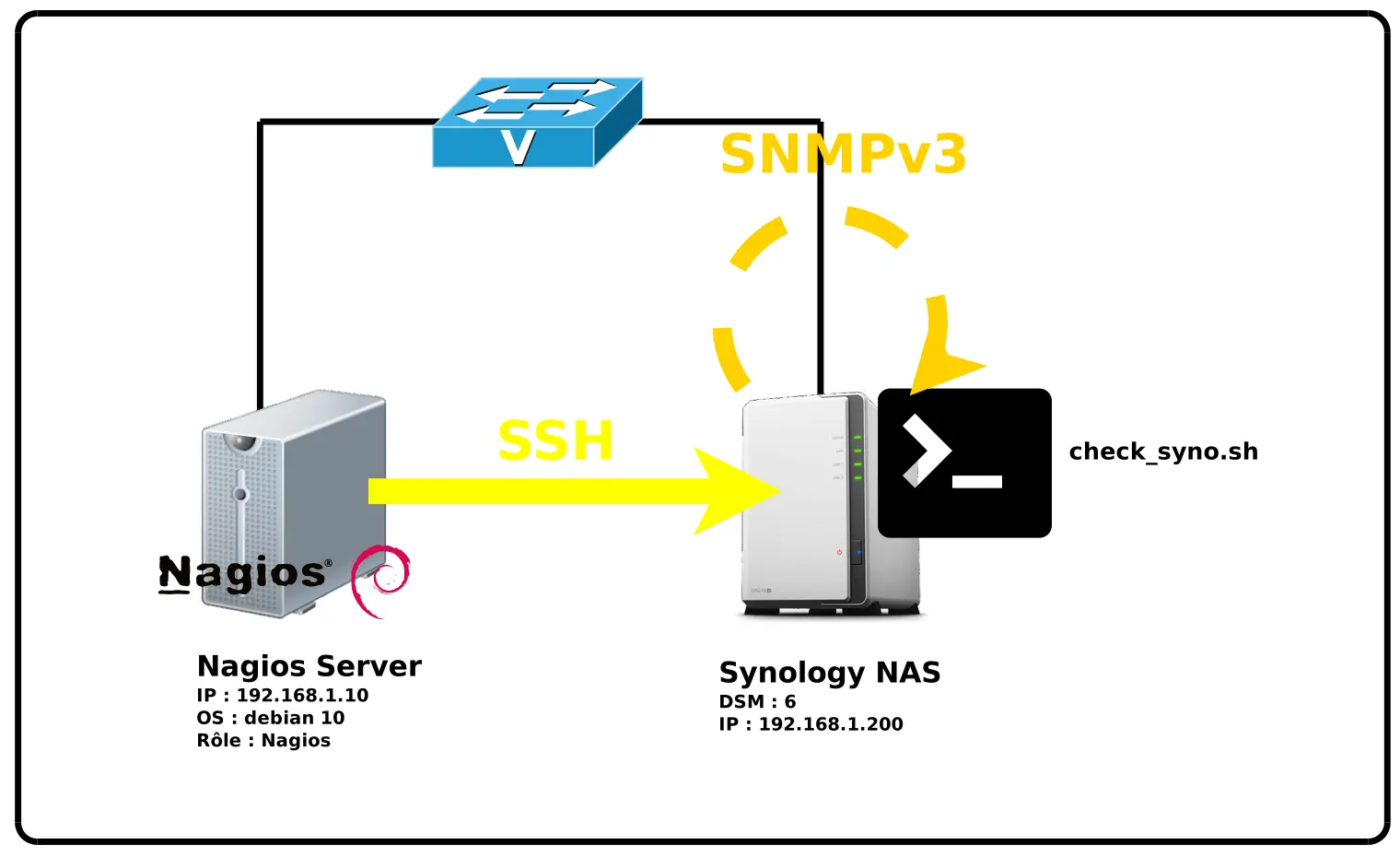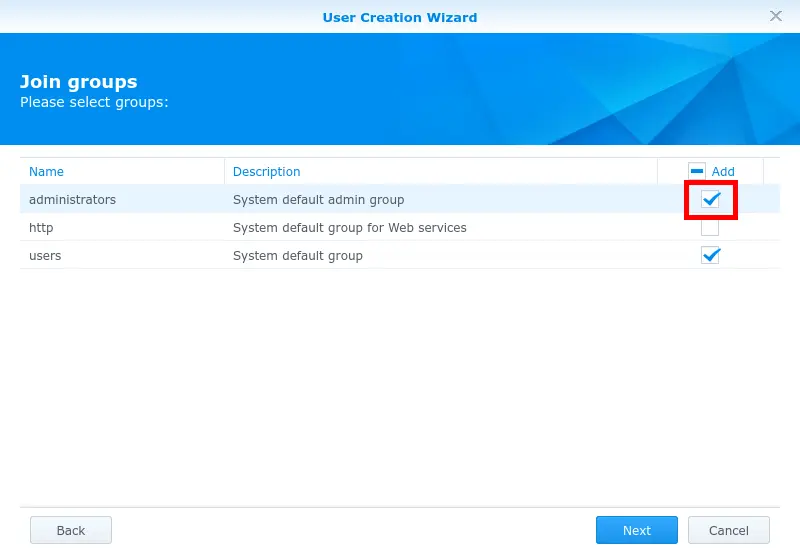Nagios plugin for Synology NAS
- Last updated: Sep 8, 2020

Here is a Bourne shell Nagios plugin which can be executed directly from the NAS Synology. It's inspired by the great work of Jur Groen and Nicolas Ordonez.
The plugin will check the following elements :
- System status (Power, Fans)
- Disks status
- RAID status
- DSM update status
- Disk usage
Configuration
- DSM : 5, 6
Instructions
Enable SNMPv3
- First we need to enable SNMPv3 from the Web Admin (set the same password for SHA and AES protocols) :

The plugin can be used remotly (from the Synology NAS) or localy (from the Nagios server).
⚠️ Note that the disk usage functionality is only available with the remote method.
- From Nagios Server, install sudo and snmp tools :
root@host:~# apt install sudo snmpLocal method
Here, the plugin will be executed from the Nagios Server and will send requests via SNMPv3.

- Add execution rights to the plugin
root@host:~# chmod +x ./check_syno.sh- Execute as Nagios user to be sure that everyhting is fine
root@host:~# sudo -u nagios ./check_syno.sh -u user -p PassW0RD -h 192.168.1.200- Output
OK - The NAS DS218j - SN : 254262N214800 - DSM : DSM 6.2-25426 is fine
NAS temperature is 40°C - Fan Status : OK - CPU Fan Status : OK - Power Status : OK - System Status : OK
The Hard Drive 2 model HD204UI is functioning normally
The Hard Drive 1 model WD20EARX-00PASB0 is functioning normally
The RAID Storage Pool 1 is fine The RAID Volume 2 is fine
Remote method
Here, the plugin will be launched from the Nagios Server via ssh and executed on the NAS Synology. In this mode disk usage functionality will be available.

Create new user from Web Interface
- root user is not allowed to connect through ssh so we need to create a new user with administrators rights :

Enable ssh key authentication
- Still from NAS Synology, edit
/etc/ssh/sshd_configand uncomment this lines :
SAAuthentication yes
PubkeyAuthentication yes
AuthorizedKeysFile .ssh/authorized_keys- Restart sshd service :
synoservicectl --restart sshd- Set correct files permissions :
chmod 0711 ~
chmod 0711 ~/.ssh
chmod 0600 ~/.ssh/authorized_keys- Now, from Nagios Server generate rsa keys for nagios User :
root@host:~# sudo -u nagios ssh-keygen -t rsa- From Nagios Server, export nagios user SSH key to the Synology NAS :
root@host:~# sudo -u nagios cat /var/lib/nagios/.ssh/id_rsa.pub | ssh SSH_USER@192.168.1.200 'cat >> .ssh/authorized_keys' - Copy the plugin to the NAS :
user@host:~$ scp check_syno.sh SSH_USER@192.168.1.200:/usr/syno/sbin/- and run the following command :
root@host:~# sudo -u nagios ssh -l SSH_USER 192.168.1.200 /usr/syno/sbin/check_syno.sh -h 127.0.0.1 -u SNMP_USER -p SNMP_PASSWORD -w 80 -c 90- Output
OK - The NAS DS218j - SN : 254262N214800 - DSM : DSM 6.2-25426 is fine
NAS temperature is 40°C - Fan Status : OK - CPU Fan Status : OK - Power Status : OK - System Status : OK
The Hard Drive 2 model HD204UI is functioning normally
The Hard Drive 1 model WD20EARX-00PASB0 is functioning normally
The RAID Storage Pool 1 is fine The RAID Volume 2 is fine
/volume2 is used at 49%, 947G remaining free space
/tmp is used at 1%, 249M remaining free space
/ is used at 42%, 1.3G remaining free space- You can read silica.io article for detailled informations about key authentification on a Synology NAS.
check_syno.sh
#! /bin/bash
# check_snmp_synology for nagios version 1.4
# 30.04.2013 Nicolas Ordonez, Switzerland
# 03.10.2014 Jur Groen, Syso IT Services, The Netherlands
# 06.11.2014 shebangthedolphins.net
# 05.12.2014 shebangthedolphins.net add disk usage check
# 17.09.2020 shebangthedolphins.net bugs correction, DSM 6 compatibility, improve snmpv3 security (SHA and AES)
#---------------------------------------------------
# this plugin checks the health of your Synology NAS
# - System status (Power, Fans)
# - Disks status
# - RAID status
# - DSM update status
#
# this plugin now makes use of SNMP V3 for enhanced security
# Tested with DSM 6.0
#---------------------------------------------------
# Based on http://download.synology.com/download/ds/userguide/Synology_DiskStation_MIB_Guide_enu_20110725.pdf
#---------------------------------------------------
#Variables definition
## NAGIOS returns
CRITICAL=2
WARNING=1
OK=0
RETURN=0 #everything's fine, by default
## If arguments found
option_found=0
#get the number of partitions
NB_part=$(df -h | grep "/" | grep -v "\(\/tmpfs\|\/shm\|\/sys\|\/run\|\/dev$\|\/rootfs\)" | wc -l)
##OIDs
OID_syno="1.3.6.1.4.1.6574"
OID_model="1.3.6.1.4.1.6574.1.5.1.0"
OID_serialNumber="1.3.6.1.4.1.6574.1.5.2.0"
OID_DSMVersion="1.3.6.1.4.1.6574.1.5.3.0"
OID_upgradeAvailable="1.3.6.1.4.1.6574.1.5.4.0"
OID_systemStatus="1.3.6.1.4.1.6574.1.1.0"
OID_powerStatus="1.3.6.1.4.1.6574.1.3.0"
OID_systemFanStatus="1.3.6.1.4.1.6574.1.4.1.0"
OID_CPUFanStatus="1.3.6.1.4.1.6574.1.4.2.0"
OID_temp="1.3.6.1.4.1.6574.1.2.0"
OID_disk=""
OID_diskID="1.3.6.1.4.1.6574.2.1.1.2"
OID_diskModel="1.3.6.1.4.1.6574.2.1.1.3"
OID_diskStatus="1.3.6.1.4.1.6574.2.1.1.5"
OID_diskTemp="1.3.6.1.4.1.6574.2.1.1.6"
OID_RAID=""
OID_RAIDName="1.3.6.1.4.1.6574.3.1.1.2"
OID_RAIDStatus="1.3.6.1.4.1.6574.3.1.1.3"
#Functions
FunctionDiskSpace()
{
if [ "$HOSTNAME" == "127.0.0.1" ]; then #check disk usage only if executed on the synology nas
for i in $(seq 1 "$NB_part"); do
PARTITION=$(df -h | grep "/" | tr -s " " | grep -v "\(\/tmpfs\|\/shm\|\/sys\|\/run\|\/dev$\|\/rootfs\)" | head -n "$i" | tail -n 1 | grep "/" | cut -d " " -f 6)
UTI=$(df -h | grep "/" | tr -s " " | grep -v "\(\/tmpfs\|\/shm\|\/sys\|\/run\|\/dev$\|\/rootfs\)" | head -n "$i" | tail -n 1 | grep "/" | cut -d " " -f 5)
DISPO=$(df -h | grep "/" | tr -s " " | grep -v "\(\/tmpfs\|\/shm\|\/sys\|\/run\|\/dev$\|\/rootfs\)" | head -n "$i" | tail -n 1 | grep "/" | cut -d " " -f 4)
SORTIE="$(echo ""$PARTITION" is used at "$UTI", "$DISPO" remaining free space") \n"$SORTIE""
TEST=$(echo "$UTI" | sed 's/%//')
if [ $TEST -gt "$WARNING_SPACE" ]; then
RETURN="$WARNING"
if [ "$TEST" -gt "$CRITICAL_SPACE" ]; then
RETURN="$CRITICAL"
fi
fi
done
if [ "$1" == "Output" ]; then
echo -e "$SORTIE"
fi
SORTIE=""
fi
}
usage()
{
echo "usage: ./check_snmp_synology -u [snmp username] -p [snmp password] -h [hostname] -w [warning occuped space in %] -c [max occuped space in %]"
echo ""
exit 3
}
while getopts u:p:h:c:w: OPTNAME; do
case "$OPTNAME" in
u)
SNMPUSERNAME="$OPTARG"
option_found=1
;;
p)
SNMPPASSWORD="$OPTARG"
option_found=1
;;
h)
HOSTNAME="$OPTARG"
option_found=1
;;
w)
WARNING_SPACE="$OPTARG"
option_found=1
;;
c)
CRITICAL_SPACE="$OPTARG"
option_found=1
;;
*)
usage
;;
esac
done
# Script beginning :
if [ "$option_found" -eq "0" ] || [ "$HOSTNAME" == "" ] ; then
usage
else
# DiskSpace function usage but without print anything
FunctionDiskSpace NoOutput
nbDISK=$(snmpwalk -OQne -v 3 -t 10 -l authNoPriv -u $SNMPUSERNAME -a SHA -A "$SNMPPASSWORD" -x AES -X "$SNMPPASSWORD" $HOSTNAME .1.3.6.1.4.1.6574.2.1.1.3 2>/dev/null|wc -l)
#if SNMP failed, exit with error
if [ "$?" != "0" ] ; then
echo "CRITICAL - Problem with SNMP request"
exit "$CRITICAL"
fi
nbRAID=$(snmpwalk -OQne -v 3 -t 10 -l authNoPriv -u $SNMPUSERNAME -a SHA -A "$SNMPPASSWORD" -x AES -X "$SNMPPASSWORD" $HOSTNAME .1.3.6.1.4.1.6574.3.1.1.2 2>/dev/null|wc -l)
for i in $(seq 1 $nbDISK);
do
OID_DISK="$OID_disk $OID_diskID.$(($i-1)) $OID_diskModel.$(($i-1)) $OID_diskStatus.$(($i-1)) $OID_diskTemp.$(($i-1)) "
done
for i in $(seq 1 $nbRAID);
do
OID_RAID="$OID_RAID $OID_RAIDName.$(($i-1)) $OID_RAIDStatus.$(($i-1))"
done
#MODEL
temp=$(snmpwalk -OQne -t 10 -v 3 -l authNoPriv -u "$SNMPUSERNAME" -a SHA -A "$SNMPPASSWORD" -x AES -X "$SNMPPASSWORD" "$HOSTNAME" "$OID_model" 2>/dev/null)
model=$(echo $temp | grep $OID_model | cut -d " " -f3 | sed "s/\"//g")
#echo $model
#serialNumber
temp=$(snmpwalk -OQne -t 10 -v 3 -l authNoPriv -u "$SNMPUSERNAME" -a SHA -A "$SNMPPASSWORD" -x AES -X "$SNMPPASSWORD" "$HOSTNAME" "$OID_serialNumber" 2>/dev/null)
serialNumber=$(echo $temp | grep $OID_serialNumber | cut -d " " -f3 | sed "s/\"//g")
#echo $serialNumber
#OID_upgradeAvailable
temp=$(snmpwalk -OQne -t 10 -v 3 -l authNoPriv -u "$SNMPUSERNAME" -a SHA -A "$SNMPPASSWORD" -x AES -X "$SNMPPASSWORD" "$HOSTNAME" "$OID_upgradeAvailable" 2>/dev/null)
#OID_DSMVersion
temp=$(snmpwalk -OQne -t 10 -v 3 -l authNoPriv -u "$SNMPUSERNAME" -a SHA -A "$SNMPPASSWORD" -x AES -X "$SNMPPASSWORD" "$HOSTNAME" "$OID_DSMVersion" 2>/dev/null)
DSMVersion=$(echo $temp | grep $OID_DSMVersion | cut -d "\"" -f2)
#echo "$DSMVersion"
#OID_systemStatus
temp=$(snmpwalk -OQne -t 10 -v 3 -l authNoPriv -u "$SNMPUSERNAME" -a SHA -A "$SNMPPASSWORD" -x AES -X "$SNMPPASSWORD" "$HOSTNAME" "$OID_systemStatus" 2>/dev/null)
systemStatus=$(echo $temp | grep $OID_systemStatus | cut -d " " -f3 | sed "s/\"//g")
#echo $systemStatus
#OID_powerStatus
temp=$(snmpwalk -OQne -t 10 -v 3 -l authNoPriv -u "$SNMPUSERNAME" -a SHA -A "$SNMPPASSWORD" -x AES -X "$SNMPPASSWORD" "$HOSTNAME" "$OID_powerStatus" 2>/dev/null)
powerStatus=$(echo $temp | grep $OID_powerStatus | cut -d " " -f3 | sed "s/\"//g")
#echo $powerStatus
#OID_systemFanStatus
temp=$(snmpwalk -OQne -t 10 -v 3 -l authNoPriv -u "$SNMPUSERNAME" -a SHA -A "$SNMPPASSWORD" -x AES -X "$SNMPPASSWORD" "$HOSTNAME" "$OID_systemFanStatus" 2>/dev/null)
systemFanStatus=$(echo $temp | grep $OID_systemFanStatus | cut -d " " -f3 | sed "s/\"//g")
#echo $systemFanStatus
#OID_CPUFanStatus
temp=$(snmpwalk -OQne -t 10 -v 3 -l authNoPriv -u "$SNMPUSERNAME" -a SHA -A "$SNMPPASSWORD" -x AES -X "$SNMPPASSWORD" "$HOSTNAME" "$OID_CPUFanStatus" 2>/dev/null)
CPUFanStatus=$(echo $temp | grep $OID_CPUFanStatus | cut -d " " -f3 | sed "s/\"//g")
#echo $CPUFanStatus
#OID_temp
temp=$(snmpwalk -OQne -t 10 -v 3 -l authNoPriv -u "$SNMPUSERNAME" -a SHA -A "$SNMPPASSWORD" -x AES -X "$SNMPPASSWORD" "$HOSTNAME" "$OID_temp" 2>/dev/null)
TEMP=$(echo "$temp" | grep "$OID_temp" | cut -d " " -f3 | sed "s/\"//g")
#echo "$TEMP"
#Disks state
for i in $(seq 1 "$nbDISK")
do
temp01=$(snmpwalk -OQne -t 10 -v 3 -l authNoPriv -u "$SNMPUSERNAME" -a SHA -A "$SNMPPASSWORD" -x AES -X "$SNMPPASSWORD" "$HOSTNAME" "$OID_diskStatus.$(($i-1))" 2>/dev/null)
temp02=$(snmpwalk -OQne -t 10 -v 3 -l authNoPriv -u "$SNMPUSERNAME" -a SHA -A "$SNMPPASSWORD" -x AES -X "$SNMPPASSWORD" "$HOSTNAME" "$OID_diskModel.$(($i-1))" 2>/dev/null)
temp03=$(snmpwalk -OQne -t 10 -v 3 -l authNoPriv -u "$SNMPUSERNAME" -a SHA -A "$SNMPPASSWORD" -x AES -X "$SNMPPASSWORD" "$HOSTNAME" "$OID_diskID.$(($i-1))" 2>/dev/null)
temp04=$(snmpwalk -OQne -t 10 -v 3 -l authNoPriv -u "$SNMPUSERNAME" -a SHA -A "$SNMPPASSWORD" -x AES -X "$SNMPPASSWORD" "$HOSTNAME" "$OID_diskTemp.$(($i-1))" 2>/dev/null)
status=$(echo "$temp01" | grep "$OID_disk" | cut -d " " -f3)
diskmodel=$(echo "$temp02" | grep "$OID_disk" | cut -d "\"" -f2 | sed 's/\s//g')
ID=$(echo "$temp03" | grep "$OID_disk" | cut -d "\"" -f2)
temp=$(echo "$temp04" | grep "$OID_disk" | cut -d " " -f3)
if [ "$status" -eq "5" ]; then
disques="$(echo "The Hard "$ID" model "$diskmodel" is damaged")\\n"$disques""
RETURN="$CRITICAL"
elif [ "$status" -eq "4" ]; then
disques="$(echo "The Hard "$ID" model "$diskmodel" has partitions damaged")\\n"$disques""
RETURN="$CRITICAL"
elif [ "$status" -eq "3" ]; then
disques="$(echo "The Hard "$ID" model "$diskmodel" is not partitioned")\\n"$disques""
RETURN="$WARNING"
elif [ "$status" -eq "2" ]; then
disques="$(echo "The Hard "$ID" model "$diskmodel" has system partitions but no data")\\n"$disques""
RETURN="$WARNING"
elif [ "$status" -eq "1" ]; then
disques="$(echo "The Hard "$ID" model "$diskmodel" is functioning normally")\\n"$disques""
#RETURN=$(echo "$OK")
else
disques="$(echo "The Hard "$ID" model "$diskmodel" is in an unknown state")\\n"$disques""
RETURN="$WARNING"
fi
done
#RAID State
for i in $(seq 1 "$nbRAID")
do
temp01=$(snmpwalk -OQne -t 10 -v 3 -l authNoPriv -u "$SNMPUSERNAME" -a SHA -A "$SNMPPASSWORD" -x AES -X "$SNMPPASSWORD" "$HOSTNAME" "$OID_RAIDName.$(($i-1))" 2>/dev/null)
temp02=$(snmpwalk -OQne -t 10 -v 3 -l authNoPriv -u "$SNMPUSERNAME" -a SHA -A "$SNMPPASSWORD" -x AES -X "$SNMPPASSWORD" "$HOSTNAME" "$OID_RAIDStatus.$(($i-1))" 2>/dev/null)
Volume=$(echo "$temp01" | grep "$OID_disk" | cut -d "\"" -f2)
Statut=$(echo "$temp02" | grep "$OID_disk" | cut -d " " -f3)
if [ "$Statut" -eq "11" ]; then
raids="$(echo "The RAID "$Volume" is degraded") "$raids""
RETURN="$CRITICAL"
elif [ "$Statut" -eq "12" ]; then
raids="$(echo "The RAID "$Volume" has crashed") "$raids""
RETURN="$CRITICAL"
elif [ "$Statut" -eq "1" ]; then
raids="$(echo "The RAID "$Volume" is fine") "$raids""
else
raids="$(echo "The RAID "$Volume" is in an unknown state") "$raids""
RETURN="$WARNING"
fi
done
# Nagios States
if [ "$RETURN" -eq "2" ] || [ "$systemFanStatus" -eq "2" ] || [ "$CPUFanStatus" -eq "2" ] || [ "$powerStatus" -eq "2" ] || [ "$systemStatus" -eq "2" ]; then
echo -e "CRITICAL - The NAS "$model" - SN : "$serialNumber" - DSM : "$DSMVersion" has a problem"
echo -e "NAS temperature is "$TEMP"°C - Fan Status : "$systemFanStatus" - CPU Fan Status : "$CPUFanStatus" - Power Status : "$powerStatus" - System Status : "$systemStatus" " | sed 's/ 1 / OK
for i in "$disques"; do
echo -e "$i" | sed '/^$/d'
done
for i in "$raids"; do
echo -e "$i" | sed '/^$/d'
done
FunctionDiskSpace Output
exit "$CRITICAL"
fi
if [ "$RETURN" -eq "1" ]; then
echo -e "WARNING - The NAS "$model" - SN : "$serialNumber" - DSM : "$DSMVersion" is in Warning state"
echo -e "NAS temperature is "$TEMP"°C - Fan Status : "$systemFanStatus" - CPU Fan Status : "$CPUFanStatus" - Power Status : "$powerStatus" - System Status : "$systemStatus" " | sed 's/ 1 / OK
for i in "$disques"; do
echo -e "$i" | sed '/^$/d'
done
for i in "$raids"; do
echo -e "$i" | sed '/^$/d'
done
FunctionDiskSpace Output
exit "$WARNING"
fi
if [ "$RETURN" -eq "0" ]; then
echo -e "OK - The NAS "$model" - SN : "$serialNumber" - DSM : "$DSMVersion" is fine"
echo -e "NAS temperature is "$TEMP"°C - Fan Status : "$systemFanStatus" - CPU Fan Status : "$CPUFanStatus" - Power Status : "$powerStatus" - System Status : "$systemStatus" " | sed 's/ 1 / OK /g' | sed 's/ 2 / FAILED /g'
for i in "$disques"; do
echo -e "$i" | sed '/^$/d'
done
for i in "$raids"; do
echo -e "$i" | sed '/^$/d'
done
FunctionDiskSpace Output
exit "$OK"
fi
echo -e "CRITICAL - The NAS "$model" - SN : "$serialNumber" - DSM : "$DSMVersion" is in an indeterminate State"
exit "$CRITICAL"
fi
Nagios config
I don't use Nagios anymore but the configuration should be like this.
command.cfg
define command {
command_name check_syno_local
command_line /usr/local/sbin/check_syno.sh -u $ARG1$ -p $ARG2$ -h $ARG3$
}
define command {
command_name check_syno_remote
command_line ssh -l $ARG1$ $ARG2$ /usr/syno/sbin/check_syno.sh -h 127.0.0.1 -u $ARG3$ -p $ARG4$ -w 80 -c 90
}service.cfg
define service{
use nassynology-service
host_name NAS Synology
servicegroups nas-synology
service_description Backup Local NAS
check_command check_syno_local!SNMP_USER PassW0RD 192.168.1.200
}
define service{
use nassynology-service
host_name NAS Synology
servicegroups nas-synology
service_description Backup Remote NAS
check_command check_syno_remote!SSH_USER 192.168.1.200 SNMP_USER PassW0RD
}Output

- Download : check_syno.sh
- Nagios Exchange : https://exchange.nagios.org/